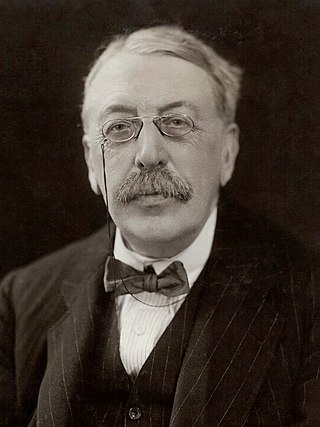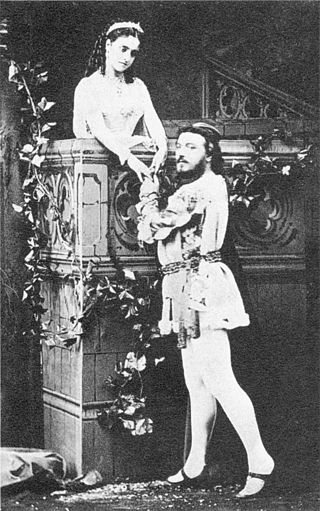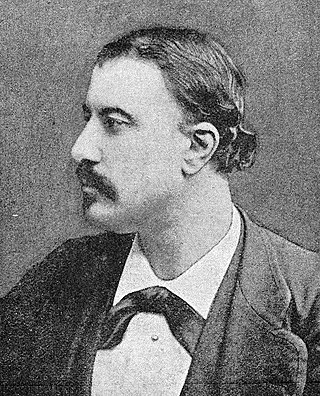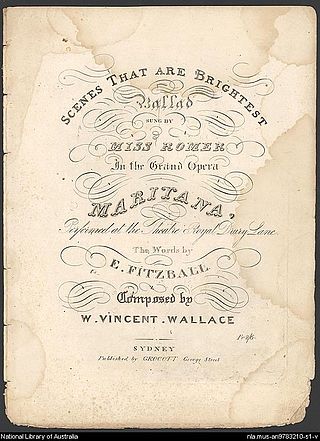
Sir Charles Villiers Stanford was an Anglo-Irish composer, music teacher, and conductor of the late Romantic era. Born to a well-off and highly musical family in Dublin, Stanford was educated at the University of Cambridge before studying music in Leipzig and Berlin. He was instrumental in raising the status of the Cambridge University Musical Society, attracting international stars to perform with it.

Ariodante is an opera seria in three acts by George Frideric Handel. The anonymous Italian libretto was based on a work by Antonio Salvi, which in turn was adapted from Canti 4, 5 and 6 of Ludovico Ariosto's Orlando Furioso. Each act contains opportunities for dance, originally composed for dancer Marie Sallé and her company.
Al-Muqanna born Hashim,, was an 8th-century political and military leader who operated in modern Iran. He led an anti-Islamic rebellion against the Abbasid Caliphate and claimed to be a prophet. He was a major figure of the Khorrām-Dīn, an Iranian religion which drew on Zoroastrian and Islamic influences.

Roméo et Juliette is an opera in five acts by Charles Gounod to a French libretto by Jules Barbier and Michel Carré, based on Romeo and Juliet by William Shakespeare. It was first performed at the Théâtre Lyrique, Paris on 27 April 1867. This opera is notable for the series of four duets for the main characters and the waltz song "Je veux vivre" for the soprano.

Arthur Goring Thomas was an English composer.

Sir Frederic Hymen Cowen, was an English composer, conductor and pianist.

Frederic Emes Clay was an English composer known principally for songs and his music written for the stage. Although from a musical family, for 16 years Clay made his living as a civil servant in HM Treasury, composing in his spare time, until a legacy in 1873 enabled him to become a full-time composer. He had his first big stage success with Ages Ago (1869), a short comic opera with a libretto by W. S. Gilbert, for the small Gallery of Illustration; it ran well and was repeatedly revived. Clay, a great friend of his fellow composer Arthur Sullivan, introduced the latter to Gilbert, leading to the Gilbert and Sullivan partnership.

Venus and Adonis is an opera in three acts and a prologue by the English Baroque composer John Blow, composed no later than 1684 and no earlier than 1681. It was written for the court of King Charles II at either London or Windsor Castle. It is considered by some to be either a semi-opera or a masque, but The New Grove names it as the earliest known English opera.

Franco Leoni was an Italian opera composer. After training in Milan, he made most of his career in England, composing for Covent Garden and West End theatres. He is best known for the opera L'oracolo, written for Covent Garden but taken up successfully by the Metropolitan Opera in New York. In addition to his operas, Leoni wrote several cantatas and oratorios and many ballads and other songs. He also worked as a conductor in London, both in the concert hall and in the theatre.

The Mystic Order of Veiled Prophets of the Enchanted Realm, also known as M.O.V.P.E.R. or The Grotto, is an appendant body in Freemasonry.

The Choice of Hercules is an oratorio in one act by George Frideric Handel. Handel produced the score between 28 June and 5 July 1750. The first performance was given on 1 March 1751 at the Covent Garden Theatre, London with Cecilia Young as Virtue, Isabella Young as Hercules, and Thomas Lowe as attendant. The libretto is derived from the poem (1743) of Robert Lowth but revised, probably, by Thomas Morell.

Koanga is an opera written between 1896 and 1897, with music by Frederick Delius and a libretto by Charles Francis Keary, inspired partly by the book The Grandissimes: A Story of Creole Life by George Washington Cable (1880). Inspiration also came from Delius's own experiences as a young man, when his family sent him to work in Florida. It was Delius's third opera, and he thought better of it than of its predecessors, Irmelin and The Magic Fountain, because of the incorporation of dance scenes and his treatment of the choruses. Koanga is reputed to be the first opera in the European tradition to base much of its melodic material on African-American music.

Susanna is an oratorio by George Frideric Handel, in English. The libretto had been questionably attributed to Newburgh Hamilton but is now thought to have been penned by the poet/playwright Moses Mendes (d.1758). The story is based on that of Susanna in chapter 13 of the Book of Daniel in the Bible. Handel composed the music in the summer of 1748 and premiered the work the next season at Covent Garden theatre, London, on 10 February 1749.

Maritana is a three-act opera including both spoken dialogue and some recitatives, composed by William Vincent Wallace, with a libretto by Edward Fitzball (1792–1873). The opera is based on the 1844 French play Don César de Bazan by Adolphe d'Ennery and Philippe François Pinel (Dumanoir), which was also the source material for Jules Massenet's opéra comique Don César de Bazan. The opera premiered at the Theatre Royal, Drury Lane on 15 November 1845.
Nicholas Comyn Gatty was an English composer and music critic. As a composer his major output was opera, which was generally regarded as musically undistinguished but well-presented theatrically. As a critic he worked for the Pall Mall Gazette and The Times, and served as assistant editor for the second and third editions of Grove.
Virginia Kerr is an Irish soprano who appears frequently in concerts, opera, oratorio and recitals.
Much Ado About Nothing is an opera in four acts by Charles Villiers Stanford, to a libretto by Julian Sturgis based on Shakespeare's play Much Ado About Nothing. It was the composer's seventh completed opera.
(The) Veiled Prophet may refer to:

William Barclay Squire was a British musicologist, librarian and librettist.

Three Latin Motets, Op. 38, is a collection of three sacred motets based on Latin texts for mixed unaccompanied choir by Charles Villiers Stanford, comprising Justorum animae, Coelos ascendit hodie and Beati quorum via. The texts come from different sources, and the scoring is for four to eight parts. They were published by Boosey & Co in 1905. The works, some of Stanford's few settings of church music in Latin, have remained in the choral repertoire internationally and are performed in liturgies and concert.













